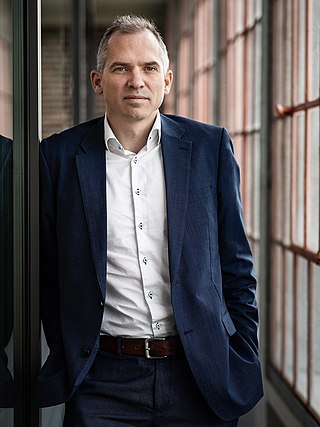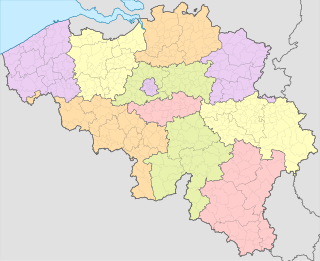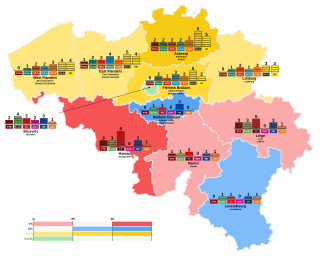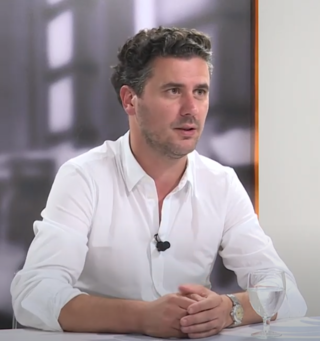Pascal Smet | |
|---|---|
 | |
| Brussels Minister of Mobility and Public Works | |
| Personal details | |
| Born | 30 July 1967 Haasdonk |
| Nationality | Belgian |
| Occupation | politician |
Pascal Smet (born 30 July 1967) is a Belgian politician, member of Vooruit.
Pascal Smet | |
|---|---|
 | |
| Brussels Minister of Mobility and Public Works | |
| Personal details | |
| Born | 30 July 1967 Haasdonk |
| Nationality | Belgian |
| Occupation | politician |
Pascal Smet (born 30 July 1967) is a Belgian politician, member of Vooruit.
He was born in 1967 in Beveren-Waas. He earned a degree in law at the University of Antwerp. He is openly gay. [1]
He was a member of the town council of Beveren-Waas from 1989 to 1997 and a member of the province council of East Flanders (1991–1994).
He served as Belgium's Commissioner General for refugees and stateless people (2001–2003). In 2003 he became Secretary of State in the government of the Brussels-Capital Region with the competences of Mobility, the Civil Service, Fire Department, Urgent Medical Assistance and chairman of the Flemish Community Commission with the competences of Culture, Sport, the Civil Service and Media.
After the regional elections of 2004 Pascal Smet became a minister. From 2004 to 2009 he was minister in the government of the Brussels-Capital Region. He dealt with mobility and public works in the Brussels capital region. He was also competent for culture, sport and youth for the Flemish community in Brussels.
From 2006 to 2018, he was a member of the city council of the City of Brussels. Until 2012 he was also Schepen for Public Works, in name only, as the position was incompatible with his government functions.
After the 2009 regional elections, the SP.a was ousted from the Brussels government and on 13 July 2009 Smet became then a member of the Peeters II Government as Flemish Minister for Education, Youth, Equal Opportunities and Brussels Affairs.
In the 2014 regional elections he ran for the Brussels Parliament, after which he became Minister of Mobility and Public Works in the Brussels-Capital government again.
After the 2019 regional elections he became Secretary of State for Urbanism and Heritage, European and International Relations, Foreign Trade and Fire fighting and Emergency medical Assistance.
Pascal Smet has been lobbying for Uber. [2]
On 18 June 2023 he resigned after sparking a furore by hosting an Iranian delegation led by Alireza Zakani. [3] [4] Ans Persoons replaced him. [5]

The minister-president of Flanders is the head of the Flemish Government, which is the executive branch of the Flemish Region and Flemish Community.
Vooruit is a Flemish social democratic political party in Belgium. It was known as the (Flemish) Socialist Party until 21 March 2021, when its current name was adopted.

Groen, founded as Agalev, is a green Flemish political party in Belgium. The main pillars of the party are social justice, human rights, and ecologism. Its French-speaking equivalent is Ecolo; the two parties maintain close relations with each other.

The Flemish Parliament constitutes the legislative power in Flanders for matters which fall within the competence of Flanders, both as a geographic region and as a cultural community of Belgium.

The Flemish Community is one of the three institutional communities of Belgium, established by the Belgian constitution and having legal responsibilities only within the precise geographical boundaries of the Dutch-language area and of the bilingual area of Brussels-Capital. Unlike in the French Community of Belgium, the competences of the Flemish Community have been unified with those of the Flemish Region and are exercised by one directly elected Flemish Parliament based in Brussels.

The Federal Government of Belgium exercises executive power in the Kingdom of Belgium. It consists of ministers and secretary of state drawn from the political parties which form the governing coalition. The federal government is led by the prime minister of Belgium, and ministers lead ministries of the government. Ministers together form the Council of Ministers, which is the supreme executive organ of the government.

The Belgian provincial, municipal and district elections of 2006 took place on Sunday 8 October 2006. The electors have elected the municipal councillors of 589 cities and towns as well as the ten provincial councils. The voters in the town of Antwerp have also been able to vote for the city's district councils. In seven Flemish municipalities with a special language statute and in the Walloon municipality of Comines-Warneton the aldermen and the members of the OCMW/CPAS council have also been directly elected.

The fusion of the Belgian municipalities was a Belgian political process that rationalized and reduced the number of municipalities in Belgium between 1964 and 1983. In 1961, there were 2,663 such municipalities; by 1983, these had been re-arranged and combined into 589 municipalities.

The Council of Ministers is the supreme executive organ of the Federal Government of the Kingdom of Belgium. It is a cabinet composed of the Prime Minister, who leads it, and up to fourteen senior ministers. Federal secretaries of state are members of the government, but not part of the Council. The King of the Belgians historically presided over the Council, but this has not happened since 1957. The Council of Ministers formally became a permanent policy structure with the constitutional revision of 1970.

Federal elections were held in Belgium on 26 May 2019, alongside the country's European and regional elections. All 150 members of the Chamber of Representatives were elected from eleven multi-member constituencies.

The De Croo Government is the incumbent Federal Government of Belgium, led by Prime Minister Alexander De Croo since 1 October 2020. It has acted in a caretaker capacity since the resignation of Prime Minister Alexander De Croo on 10 June 2024 following the 2024 Belgian federal election.

Conner Rousseau is a Belgian politician and chairman of the social-democratic Flemish Vooruit party. He became its chairman in November 2019 at the age of 26.

Nicole de Moor is a Belgian politician, a member of CD&V. On 28 June 2022, she became Secretary of State for Asylum and Migration in the government of Alexander De Croo.

Federal elections were held in Belgium on 9 June 2024. The Chamber of Representatives received 150 members with five-year terms. European and regional elections took place on the same day.
The 2024 Belgian provincial, municipal and district elections took place on Sunday 13 October 2024, four months after the simultaneous European, federal and regional elections.
Oskar Seuntjens is a Belgian politician and member of the Chamber of Representatives. A member of Vooruit, he has represented Antwerp since June 2024.

Brent Meuleman is a Belgian politician and member of the Chamber of Representatives. A member of Vooruit, he has represented East Flanders since June 2024.

Joris Vandenbroucke is a Belgian politician and member of the Chamber of Representatives. A member of Vooruit, he has represented East Flanders since June 2019. He was a member of the Flemish Parliament from June 2005 to June 2009 and from June 2014 to May 2019.
Fouad Ahidar is a Belgian politician who currently serves as the leader of Team Fouad Ahidar, political party in Belgium. He is currently a member of the Parliament of the Brussels-Capital Region.